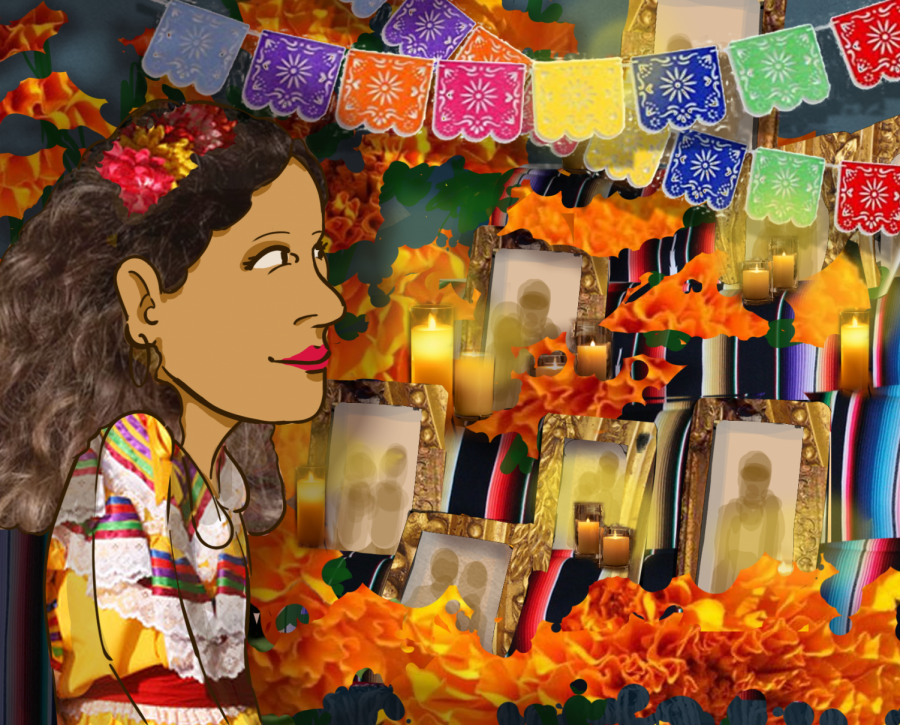Campuswide ofrenda creates space to honor loved ones for Día de los Muertos
December 18, 2021
Editor’s Note: This article first appeared in the November 5 flipbook.
After setting down the finishing pieces on the ofrenda, or “offering” in English, she and her grandmother built together — bright orange marigolds paired with pink, white and yellow pan dulce — Kayla Sanchez stepped back and looked at the pictures of her passed loved ones. Now, three years later, Sanchez celebrates Día de los Muertos instead by submitting a photo of her grandmother to the Latino Studies website to be set up on a different ofrenda.
“This is a way to honor my grandmother,” the political communication sophomore said. “It made me feel closer to her for me to honor her. … I am passing on traditions she taught me and keeping (her) legacy alive.”
On display in the Gordon-White Building from Oct. 25 through Nov. 2, UT’s Latino Studies’ Día de los Muertos ofrenda honored Longhorns’ friends and family who have passed away. Día de los Muertos — a two-day celebration from Nov. 1 to 2 — reunites the dead and living through ofrendas to attract ancestors, salt to cleanse the spirits’ souls and water to help them along their journeys.
The department’s first campuswide ofrenda, a collaboration with the UT Humanities Institute, offered Latinx students and staff an opportunity to submit photos of loved ones and participate in a toe tag (tags used for identification purposes in morgues) workshop to celebrate their cultures in a safe space.
Since moving to campus this year, Sanchez said she started to reflect more on her culture through events and activities sponsored by Latino Studies. Sanchez said seeing photos of other Longhorns’ loved ones made her feel even more connected to her culture.
“I don’t think I actually ever appreciated being Hispanic or (having) Mexican origins until I got to Austin,” Sanchez said. “It feels like, ‘Wow, this is great. My culture is beautiful,’ and I want to show everyone.”
On Monday, Latino Studies and the UT Humanities Institute held a toe tag workshop to honor undocumented migrants who passed while on their journey across the trecherous Sonoran Desert of Southern Arizona.
“(It’s important to) give them dignity they didn’t experience in death,” said Melissa Biggs, Humanities Institute program coordinator.
Because there are extra toe tags, Biggs said she welcomes any organizations that wish to host workshops to reach out.
Ashley Nava-Monteros, Latino Studies communications specialist, submitted photos of her recently passed grandfather and her sister, who passed before Nava-Monteros was born, but whom she calls her “guardian angel.” Nava-Monteros said seeing all of the people on the ofrenda helped her feel a connection to others who also struggle with loss.
“The only thing that’s certain is death,” Nava-Monteros said. “People have different opinions and we lead very different lives, but that’s the one thing that unites us all. It’s what makes us human.”
Working in the Latino Studies department, Nava-Monteros said she realizes the importance of having spaces for minority groups on campus. She said the department calls itself a “home away from home,” a place students can confidently celebrate their identities and culture.
“We wanted to create a community healing space,” Nava-Monteros said. “It’s powerful to see all the photos that people have submitted and knowing there’s many stories and people behind each photo and realizing that there’s all these different relationships.”
Whether people pass with loved ones at their side, or, in the case of many undocumented migrants, with no one, Nava-Monteros said Día de los Muertos offers a time to remember them all.
“Grief is a really funny thing,” Nava-Monteros said. “I love that this day is turned into a celebration. It’s sad that we don’t have these people with us physically, but we know that they live on through our memories and hearts — it’s a beautiful way to bring them back to life.”



